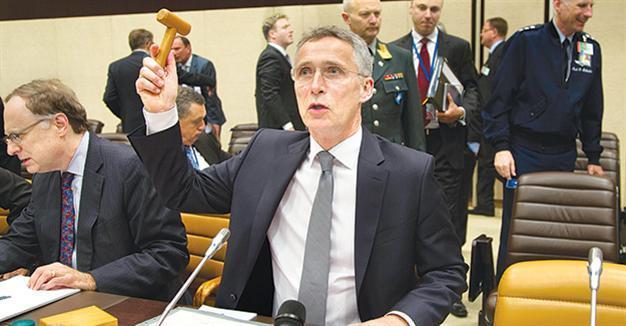NATO to send exploratory mission to Iraq
BRUSSELS
 NATO has decided to send an exploratory mission to Iraq in order to train local security forces, the alliance’s head said on May 19.
NATO has decided to send an exploratory mission to Iraq in order to train local security forces, the alliance’s head said on May 19. NATO Secretary-General Jens Stoltenberg said the foreign ministers of the 28-nation alliance had decided to send “an assessment team to Iraq as soon as possible,” following a request by Iraqi Prime Minister Haider al-Abadi to expand NATO training into Iraq.
Iraqi forces are fighting the Islamic State of Iraq and the Levant (ISIL), which control swathes of Iraq and Syria.
The ministers also discussed how the alliance could further support the Global Coalition to Counter ISIL, including with AWACS surveillance planes.
NATO’s Iraqi mission will come after its missions in Afghanistan and Somali. NATO took command of the United Nations-mandated International Security Assistance Force (ISAF) in Afghanistan in August 2003 and ISAF’s mission was completed at the end of 2014.
NATO’s foreign ministers agreed that NATO should do more to project stability beyond the alliance’s borders. Stressing that NATO must retain the ability to deploy combat forces when needed, Stoltenberg said “we must also do more to train up local forces, to secure their own territory, and push back against extremist groups.”
He underlined that such efforts are important for “preserving security here at home.”
The ministers also decided to continue preparatory work with a view to assisting Libya strengthen its defense and security institutions, provided the Libyans so request.
“We also agreed that the Alliance can do more in the Mediterranean Sea, in cooperation with the European Union and other actors,” Stoltenberg said.
He explained that NATO’s Operation Active Endeavour in the Mediterranean will become a broader maritime security operation, including tasks such as upholding freedom of navigation, interdiction, and supporting maritime counter-terrorism.
NATO said on May 20 that it would hold formal talks with Russia before a landmark July summit in Warsaw endorses the alliance’s biggest military build-up since the end of the Cold War, to counter a more assertive Russia.
In response, Russian Foreign Minister Sergei Lavrov was quoted by Interfax News Agency as saying that Stoltenberg should have first consulted Moscow before announcing such a meeting.
“Why on earth did he say that? The Russia-NATO council works on the basis of consensus,” Interfax cited Lavrov as saying, expressing Moscow’s “bewilderment.”
“If they want to discuss this, let him discuss this with us instead of making his way to the microphone,” he added.
















